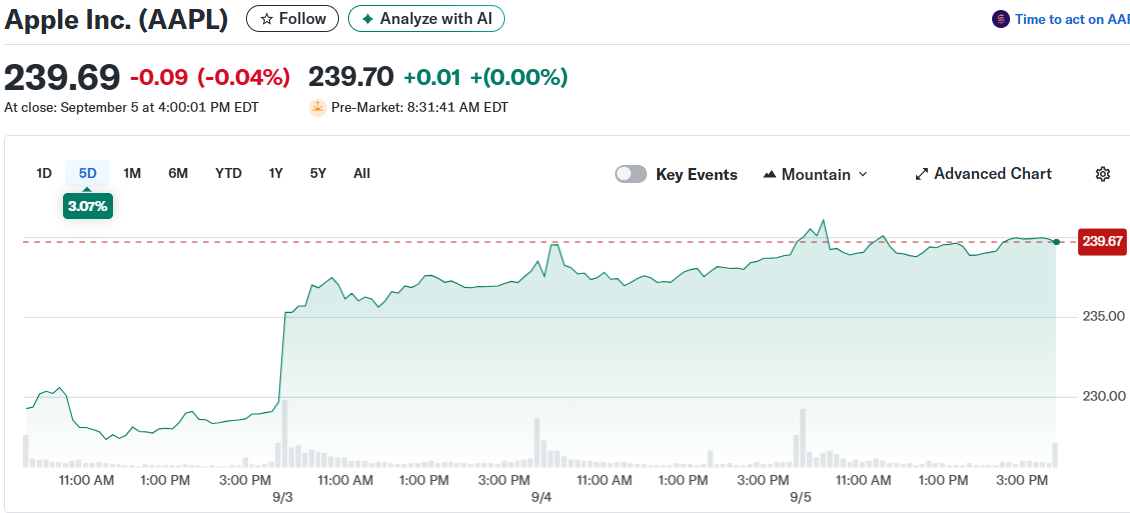TLDR
- Apple (AAPL) stock faces iPhone 17 launch September 9 with new ultrathin Air model expected
- Wall Street projects modest iPhone sales growth of 2% in fiscal 2026 reaching 232 million units
- Apple may raise prices by eliminating 128GB storage options, pushing Pro models to $1,099 entry price
- Company struggles to catch up in AI race while Samsung and Google advance with folding phone technology
- Stock down 4.3% year-to-date at $239.69 as investors await hardware refresh to drive upgrade cycle
Apple unveils its iPhone 17 lineup Tuesday as the tech giant seeks to reignite customer demand through hardware innovation. The September 9 event features four new models including an ultrathin iPhone Air design.
The iPhone 17 Air represents Apple’s thinnest smartphone yet. This new model borrows naming from the popular MacBook Air laptop line and slots between standard and Pro pricing tiers.
Apple faces engineering challenges fitting batteries and cameras into the slimmer design. The company must maintain performance standards while reducing device thickness below current iPhone models.
Pricing Strategy Drives Revenue Growth
Morgan Stanley analyst Erik Woodring expects Apple to raise prices through storage tier changes. The company may eliminate 128GB storage options for Pro models, making 256GB at $1,099 the new entry point.
This strategy effectively increases prices by $100 without direct price hikes. Wall Street projects iPhone sales reaching 232 million units in fiscal 2026, up 2% from current levels.
iPhone revenue could hit $220 billion in fiscal 2026, representing 5% growth. The iPhone generates roughly half of Apple’s total company revenue, making upgrade cycles critical for stock performance.

Apple stock trades at $239.69, down 4.3% year-to-date compared to the Nasdaq’s 12% gain. The company needs strong iPhone demand to match broader tech sector performance.
AI Development Lags Behind Competitors
Apple’s artificial intelligence progress trails rivals Samsung and Google. The company delayed Siri improvements originally planned for spring 2025 due to engineering setbacks.
Instead, Apple partnered with OpenAI to power AI features through ChatGPT integration. Google’s Pixel phones showcase Gemini AI models more prominently than Apple’s current offerings.
Reports suggest Apple explores partnerships with Google’s Gemini AI for Siri enhancements. This marks a shift from Apple’s typical preference for internal development.
Samsung leads with seventh-generation folding phones while Google offers third-generation foldable devices. Apple lacks folding phone technology that appeals to Chinese consumers where the company loses market share.
The iPhone Air could serve as a stepping stone toward foldable devices and upgraded Siri capabilities. Neither innovation is expected until 2026 at the earliest.
Apple’s next Silicon chips may offer improved AI processing without draining battery life. These advances could eventually power more sophisticated Siri features across 2.35 billion active Apple devices worldwide.
The Tuesday event begins at 1 p.m. Eastern Time and includes new Apple Watch models and AirPods Pro 3 wireless earbuds alongside the iPhone 17 series.





